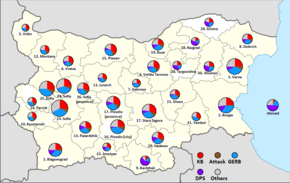Bulgarian parliamentary election, 2013
| 12 May 2013 | |||||||||||||||||||||||||||
| Turnout | 51.3% | ||||||||||||||||||||||||||
|---|---|---|---|---|---|---|---|---|---|---|---|---|---|---|---|---|---|---|---|---|---|---|---|---|---|---|---|
|
|||||||||||||||||||||||||||
| This lists parties that won seats. See the complete results below. | |||||||||||||||||||||||||||

Results by constituency
|
|||||||||||||||||||||||||||
|
|||||||||||||||||||||||||||
Parliamentary elections were held in Bulgaria on 12 May 2013, two months ahead of schedule.Protests had forced the resignation of the GERB government in February, leading to the election being moved up.
The elections resulted in a minority parliament, with no party winning a majority of seats. Furthermore, voter turnout was at its lowest since the end of the Communist era. For the first time since the return to democracy in 1990, a political party (GERB) won two elections in a row. Despite emerging victorious, GERB's leader, Boyko Borisov, called for the election results to be annulled, claiming that there had been "illegal campaigning" on the day before the election.
High electricity prices and poverty ignited mass protests in February 2013, eventually leading to the resignation of the GERB government and early elections. The elections were originally scheduled to be held in July, but had to be brought forward. The government resigned the day after clashes between the police and protesters led to bloodshed and a number of civilians being badly injured. А caretaker government was appointed on 13 March 2013 by President Rosen Plevneliev to serve until the elections. On 28 February, Plevneliev announced the earliest possible date for the election would be 12 May.
The 240 members of the National Assembly were elected by closed-list proportional representation in 31 multi-member constituencies. Parties had to receive at least 4% of the national vote to win any of the proportional seats, which were distributed using the largest remainder method.
Parties that failed to pass the 4% threshold, but received more than 1% of the national vote were to be allocated annual state subsidies to the amount of 12 leva (€6) per vote received.
As a result of the protests over electricity prices, the distribution license for Czech utility company ČEZ was revoked. President Rosen Plevneliev told parliament: "I believe that the necessary key changes in the laws should be decided by a new parliament. The decision is to hold elections."
...
Wikipedia
